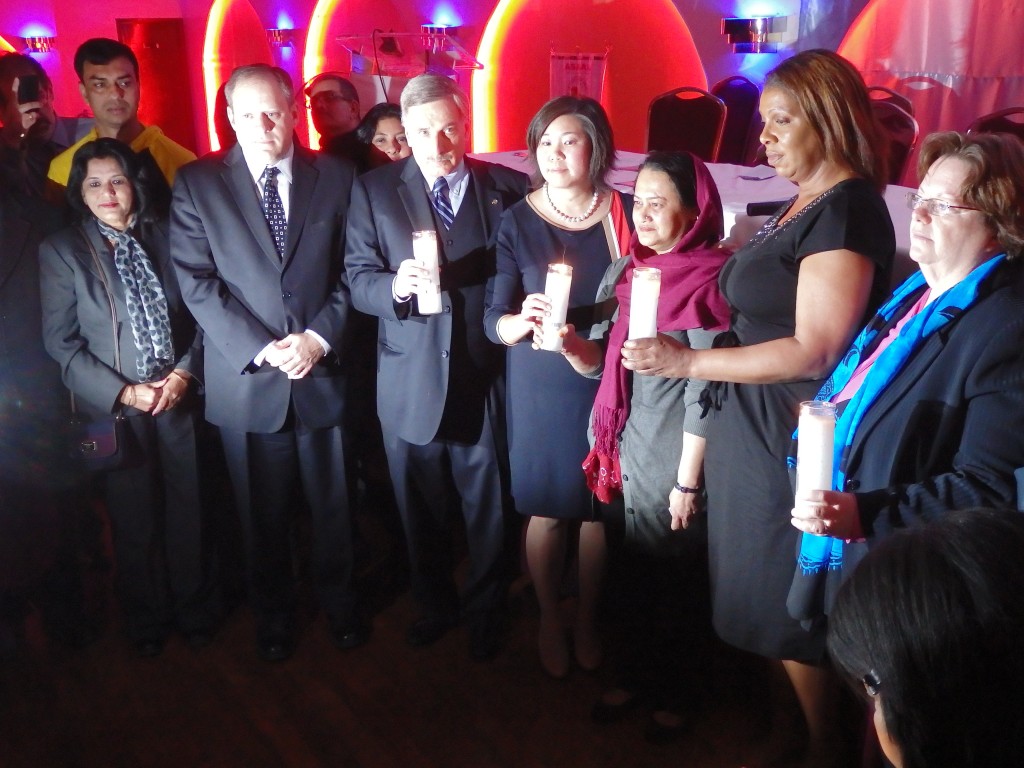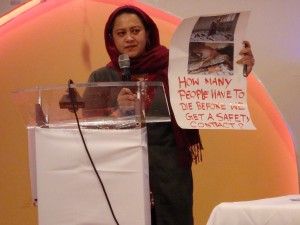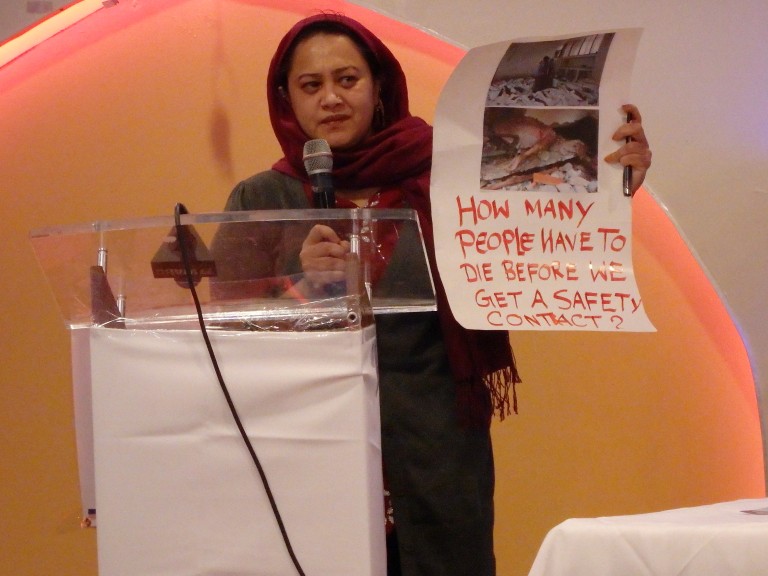
Councilman Rory Lancman, left, Assemblyman David Weprin, U.S. Rep. Grace Meng, Mazeda Uddin, Public Advocate Letitia James, and Assemblywoman Cathy Nolan gather at a vigil last week remembering those killed in a factory collapse in Bangladesh last year. Phil Corso
City leaders from all levels of government gathered in unity to light candles in memory of those who died last year in the Bangladeshi factory collapse that shed a harsh light on heinous human rights violations.
The death toll was 1,129 after the eight-story Rana Plaza factory building collapsed April 24, 2013 with over 2,000 more reported injuries. The tragedy brought Bangladesh’s deplorable working conditions to the forefront of the political agenda with several Queens officials calling for major American companies to pen a contract protecting their employees.
U.S. Rep. Grace Meng (D-Queens) hosted a vigil in the heart of one of Queens’ most Bangladeshi-influence communities at the Taj Mahal Restaurant on Hillside Avenue in Jamaica last Thursday with a packed panel of political leaders. They all stood in silence during a candlelight vigil after delivering remarks on where workers stand one year after the collapse.
Meng already fired off several fuming letters to retailers like Wal-Mart, the Gap and American Apparel calling on the companies to pump more money into worker protections.
“A year after the deadly factory collapse, Bangladesh and the Bangladeshi-American community continue to reel from this horrible tragedy,” Meng said. “A year after the disaster, we remember all who perished in this awful tragedy and we renew our call for American retailers to better protect the workers that make their products.”
Other elected officials in attendance included Public Advocate Letitia James, City Councilman Rory Lancman (D-Fresh Meadows), state Assemblywoman Cathy Nolan (D-Ridgewood), state Assemblyman David Weprin (D-Fresh Meadows) and various labor leaders. Officials took turns delivering heartfelt responses to the year in review for international workers and argued that while some progress had been made, it was not nearly enough.
“We need to challenge the notion that this is business as usual,” said Adam Obernauer of the United Food and Commercial Workers Local 1500 union. “Companies like Wal-Mart create these issues.”
City Comptroller Scott Stringer said his office would be asking some of the biggest American retailers to invest in worker safety if they wanted to do business with New York City, using his control over the city pension funds as a bargaining tool.
Mazeda Uddin of the Alliance of South Asian American Labor said one of the forgotten consequences of the disaster was companies’ failure to compensate the families of those who were killed or injured in the collapse. Several of America’s most major retailers like Wal-Mart, Sears and more have produced products out of the Rana Plaza, but only a few of them agreed to compensate for damages.

Mazeda Uddin of the Alliance of South Asian American Labor said one of the forgotten consequences of the disaster was companies’ failure to compensate the families of those who were killed or injured in the collapse. Phil Corso
Uddin said survivors and their families were working to cerate a Bangladesh Solidarity Funding committee to funnel money to families of the workers who need it most. The group has called on the United States federal government to suspend Bangladesh’s trade benefits until its government ensures workers safety and grants them better labor rights.
“There has been an assault on workers’ rights in recent decades all across the globe. However, the plight of Bangladeshi garment workers is particularly horrible,” Uddin said. “No worker, anywhere, should have to endure the horrid working conditions, unconscionably low wages, theft and threats to their lives that our sisters in Bangladesh have to endure on a daily basis. The time for action is now.”
By Phil Corso

